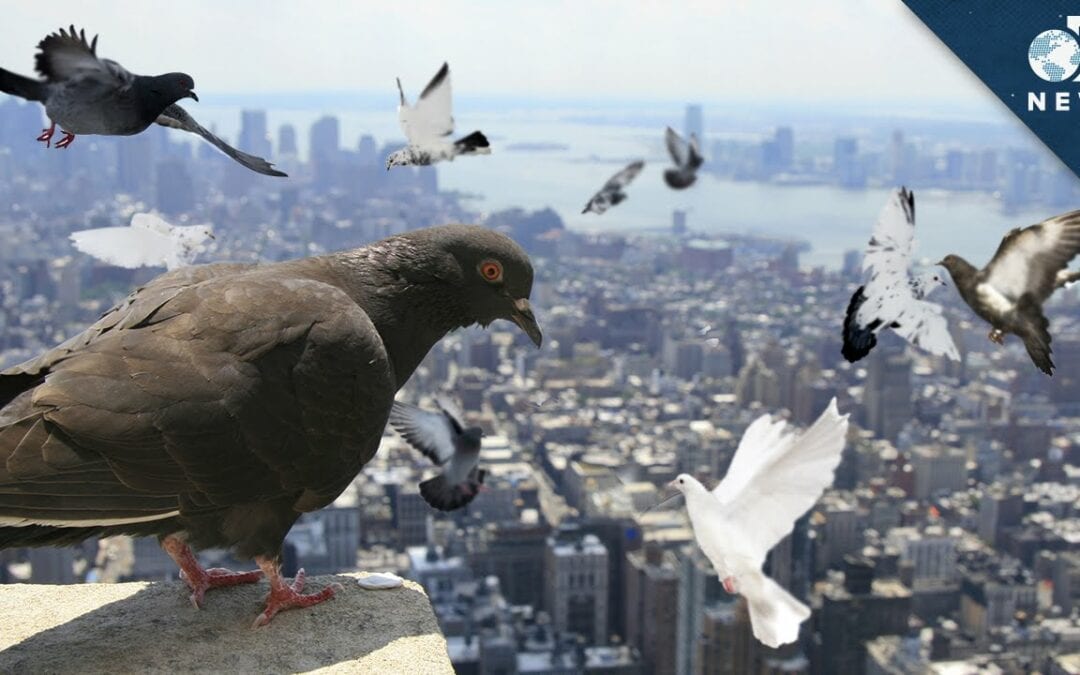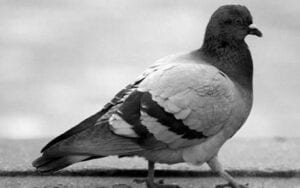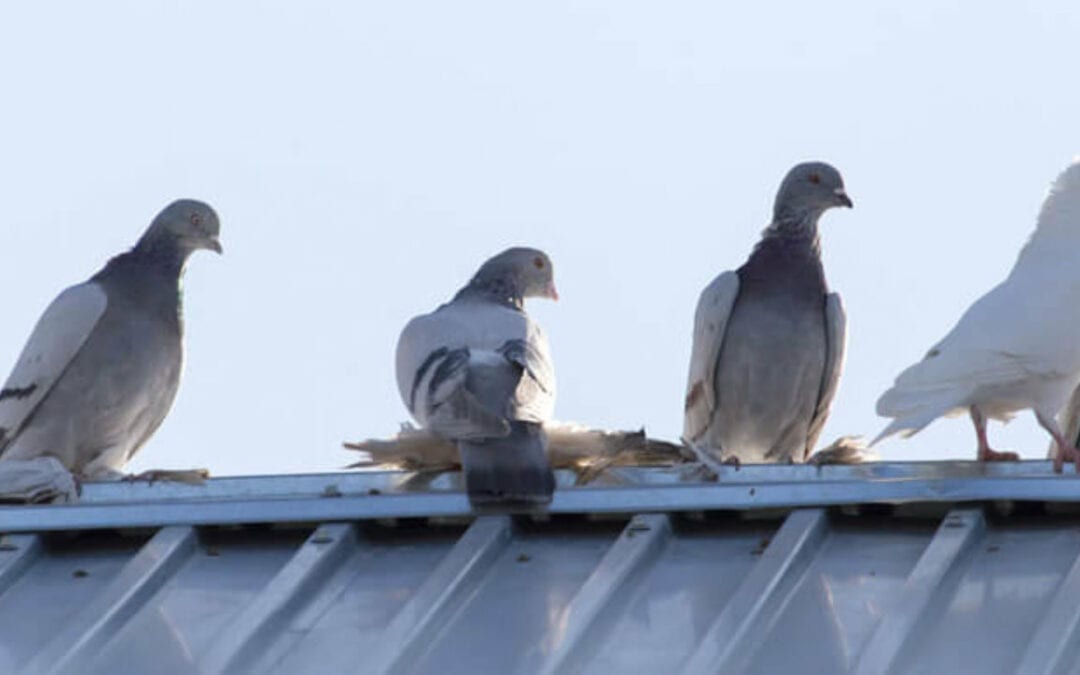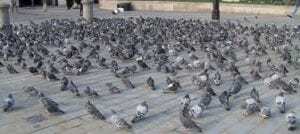
by Pigeon Patrol | Jun 21, 2021 | Pigeon Patrol's Services, Pigeon Predators, Pigeon Spikes, Pigeons, Pigeons in the News, Raccoons
It has long been recognized that birds possess the ability to use the Earth’s magnetic field for their navigation, although just how this is done has not yet been clarified. However, the discovery of iron-containing structures in the beaks of homing pigeons in a new study1 by Gerta Fleissner and her colleagues at the University of Frankfurt offers a promising insight into this complex topic. The article will be published online mid-March in Springer’s journal Naturwissenschaften.
In histological and physicochemical examinations in collaboration with HASYLAB, the synchrotron laboratories based in Hamburg, Germany, iron-containing subcellular particles of maghemite and magnetite were found in sensory dendrites² of the skin lining the upper beak of homing pigeons. This research project found that these dendrites are arranged in a complex three-dimensional pattern with different spatial orientation designed to analyze the three components of the magnetic field vector separately. They react to the Earth’s external magnetic field in a very sensitive and specific manner, thus acting as a three-axis magnetometer.

The study suggests that the birds sense the magnetic field independent of their motion and posture and thus can identify their geographical position.
The researchers further believe that this ability is not unique to homing pigeons as they expect that the ‘pigeon-type receptor system … might turn out to be a universal feature of all birds’. Equally, this concept might not only exclusively apply to birds, since it has been shown that many animals display behavior that is modified or controlled by the Earth’s magnetic field.
The meaning of these minute iron oxide crystals goes farther than their amazing ability to help pigeons home. Research into how they work has caught the interest of nanotechnologists concerning their potential application for accurate drug targeting and even as a data storage device. The main problem, however, lies in their synthetic production. According to Gerta Fleissner and her colleagues, “Even though birds have been producing these particles for millions of years, the main problem for scientists who want to find benefits from their use will be the technical production of these particles”.
1. Fleissner et al (2007). A novel concept of Fe-mineral-based magnetoreception: histological and physicochemical data from the upper beak of homing pigeons. Naturwissenschaften (DOI 10.1007/s00114-007-0236-0).
2. A dendrite is a branched extension a nerve cell (neuron)
Source
Pigeon Patrol Products & Services is the leading manufacturer and distributor of bird deterrent (control) products in Canada. Pigeon Patrol products have solved pest bird problems in industrial, commercial, and residential settings since 2000, by using safe and humane bird deterrents with only bird and animal friendly solutions. At Pigeon Patrol, we manufacture and offer a variety of bird deterrents, ranging from Ultra-flex Bird Spikes with UV protection, Bird Netting, 4-S Bird Gel and the best Ultrasonic and audible sound devices on the market today.
Voted Best Canadian wholesaler for Bird Deterrent products ten years in a row.
Contact us at 1- 877– 4– NO-BIRD, (604) 585-9279 or visit our website at www.pigeonpatrol.ca
Pigeon/Pigeon Patrol / Pigeons Roosting / Vancouver Pigeon Control /Bird Spikes / Bird Control / Bird Deterrent / Pigeon Deterrent? Surrey Pigeon Control / Pest /Seagull deterrent / Vancouver Pigeon Blog / Birds Inside Home / Pigeons in the cities / Ice Pigeons/ What to do about pigeons/ sparrows , Damage by Sparrows, How To Keep Raccoons Away, Why Are Raccoons Considered Pests/ De-fence / Pigeon Nesting/ Bird Droppings / Pigeon Dropping/ woodpecker control/ Professional Bird Control Company/ Keep The Birds Away/ Birds/rats/ seagull/pigeon/woodpecker/ dove/sparrow/pidgeon control/pidgeon problem/ pidgeon control/flying rats/ pigeon Problems/ bird netting/bird gel/bird spray/bird nails/ bird guard

by Pigeon Patrol | Jun 21, 2021 | Pigeon Predators, Pigeons, Pigeons in the News, Raccoons, Sparrows, UltraSonic Bird Control
The theory that pigeons’ famous skill at navigation is down to iron-rich nerve cells in their beaks has been disproved by a new study published in Nature.
The study shows that iron-rich cells in the pigeon beak are in fact specialised white blood cells, called macrophages. This finding, which shatters the established dogma, puts the field back on course as the search for magnetic cells continues.
“The mystery of how animals detect magnetic fields has just got more mysterious” said Dr David Keays who led the study.
Dr Keays continued: “We had hoped to find magnetic nerve cells, but unexpectedly we found thousands of macrophages, each filled with tiny balls of iron.”
Macrophages are a type of white blood cell that play a vital role in defending against infection and re-cycling iron from red blood cells. They’re unlikely to be involved in magnetic sensing as they are not excitable cells and cannot produce electrical signals which could be registered by neurons and therefore influence the pigeon’s behaviour.
Dr Keays’s lab, based at the Institute of Molecular Pathology in Vienna, worked together with Dr Shaw from the University of Western Australia, and Drs Lythgoe and Riegler from the UCL Centre for Advanced Biomedical Imaging in London.
“We employed state-of-the-art imaging techniques to visualise and map the location of iron-filled cells in the pigeon beak” said Dr Mark Lythgoe.
The search for the actual mechanism that allows migratory birds, and many other animals, to respond to the Earth’s magnetic field and navigate around their environment remains an intriguing puzzle to be solved.
“We have no idea how big the puzzle is or what the picture looks like, but today we’ve been able to remove those pieces that just didn’t fit,” said Dr Keays.
Source
Pigeon Patrol Products & Services is the leading manufacturer and distributor of bird deterrent (control) products in Canada. Pigeon Patrol products have solved pest bird problems in industrial, commercial, and residential settings since 2000, by using safe and humane bird deterrents with only bird and animal friendly solutions. At Pigeon Patrol, we manufacture and offer a variety of bird deterrents, ranging from Ultra-flex Bird Spikes with UV protection, Bird Netting, 4-S Bird Gel and the best Ultrasonic and audible sound devices on the market today.
Voted Best Canadian wholesaler for Bird Deterrent products ten years in a row.
Contact us at 1- 877– 4– NO-BIRD, (604) 585-9279 or visit our website at www.pigeonpatrol.ca
Pigeon/Pigeon Patrol / Pigeons Roosting / Vancouver Pigeon Control /Bird Spikes / Bird Control / Bird Deterrent / Pigeon Deterrent? Surrey Pigeon Control / Pest /Seagull deterrent / Vancouver Pigeon Blog / Birds Inside Home / Pigeons in the cities / Ice Pigeons/ What to do about pigeons/ sparrows , Damage by Sparrows, How To Keep Raccoons Away, Why Are Raccoons Considered Pests/ De-fence / Pigeon Nesting/ Bird Droppings / Pigeon Dropping/ woodpecker control/ Professional Bird Control Company/ Keep The Birds Away/ Birds/rats/ seagull/pigeon/woodpecker/ dove/sparrow/pidgeon control/pidgeon problem/ pidgeon control/flying rats/ pigeon Problems/ bird netting/bird gel/bird spray/bird nails/ bird guard

by Pigeon Patrol | Jun 21, 2021 | Pigeon Spikes, Pigeons, Pigeons in the News, Raccoons, Sparrows, UltraSonic Bird Control
Photographs, especially of humans, are widely used as stimuli in behavioural research with pigeons. Despite their abundant use, it is not clear to what extent pigeons perceive photographs as representing three-dimensional objects. To address this question, we trained 16 pigeons to identify individual, real-life humans. This discrimination depended primarily on visual cues from the heads of the persons. Subsequently, the pigeons were shown photographs of these individuals to test for transfer to a two-dimensional representation. Successful identification of a three-dimensional person did not facilitate learning of the corresponding photographs. These results demonstrate limitations of cross-recognition of complex objects and their photographs in pigeons.

Source
Pigeon Patrol Products & Services is the leading manufacturer and distributor of bird deterrent (control) products in Canada. Pigeon Patrol products have solved pest bird problems in industrial, commercial, and residential settings since 2000, by using safe and humane bird deterrents with only bird and animal friendly solutions. At Pigeon Patrol, we manufacture and offer a variety of bird deterrents, ranging from Ultra-flex Bird Spikes with UV protection, Bird Netting, 4-S Bird Gel and the best Ultrasonic and audible sound devices on the market today.
Voted Best Canadian wholesaler for Bird Deterrent products ten years in a row.
Contact us at 1- 877– 4– NO-BIRD, (604) 585-9279 or visit our website at www.pigeonpatrol.ca
Pigeon/Pigeon Patrol / Pigeons Roosting / Vancouver Pigeon Control /Bird Spikes / Bird Control / Bird Deterrent / Pigeon Deterrent? Surrey Pigeon Control / Pest /Seagull deterrent / Vancouver Pigeon Blog / Birds Inside Home / Pigeons in the cities / Ice Pigeons/ What to do about pigeons/ sparrows , Damage by Sparrows, How To Keep Raccoons Away, Why Are Raccoons Considered Pests/ De-fence / Pigeon Nesting/ Bird Droppings / Pigeon Dropping/ woodpecker control/ Professional Bird Control Company/ Keep The Birds Away/ Birds/rats/ seagull/pigeon/woodpecker/ dove/sparrow/pidgeon control/pidgeon problem/ pidgeon control/flying rats/ pigeon Problems/ bird netting/bird gel/bird spray/bird nails/ bird guard

by Pigeon Patrol | Jun 14, 2021 | Bird Deterrent Products, Bird Netting, Pigeon Predators, Pigeon Spikes, Pigeons, Pigeons in the News
If you could ask any animal ‘A penny for your thoughts’, which would you choose? When the question occurred to Fumihiro Kano from Kyoto University, Japan, he decided to focus on the great apes. ‘Eye movement is a good indicator of attention, cognition and emotion’, he says, explaining how he uses an infrared eye tracker to monitor ape eye movements to understand their thought processes. However, after a decade, Kano decided to switch from working with apes to investigating the minds of homing pigeons through their eyes. Bird eyes are almost fixed in their sockets, allowing Kano to infer where they are gazing from the movements of their heads alone. Teaming up with fellow primate biologist – Dora Biro from the University of Oxford, UK, who also has a passion for researching pigeon navigation – Kano set about designing a head sensor that would allow him to measure the birds’ head movements to test how they use their eyes while homing through the Oxfordshire countryside.

Combining a GPS tracker, microcomputer and battery in a pigeon-sized backpack, Kano added an inertial measurement unit, which could track the bird’s head movements using a gyroscope and accelerometers, mounted on a custom-built mask. ‘Constructing the mask was actually the most challenging, but most fun, part of this study’, smiles Kano, who frequently visited the local craft store in Oxford to try out different materials until he had perfected the wire, felt and elastic band design. ‘The most important thing was to design the mask so that it did not interfere with the bird’s breathing when flying’, he recalls, adding, ‘Most of them were okay to wear it, but some of them didn’t seem to like it and immediately took it off, so we continued to modify the design until they were comfortable’. Once Kano, James Walker, Takao Sasaki and Biro were confident that the pigeons were content to fly wearing their new accessories, the team drove the birds 4 km up the road and then released them individually for the 10 min flight home.
Downloading the data after each bird returned, the team was delighted to see every detail of the head manoeuvres, in addition to the GPS plot of the return flight path. The first thing that they noticed was how stable the birds’ heads were; ‘it is like a high spec gimbal’, says Kano, describing how the heads of the animals barely wobbled. It was also clear that the pigeons were actively glancing from side to side, scanning the landscape, during their solo flights; ‘[They] moved their heads far more than necessary for manoeuvring flight’, says Kano. In addition, the birds reduced their head movements when approaching landmarks, including a main road and a railway line, ‘which indicates that they indeed “see” them to navigate’, says Kano. Finally, the scientists dispatched the birds in pairs to learn more about how they use their eyes when flocking, and noticed that the birds reined in their head movements when flying with a partner, ‘indicating that the flock-mate is a key visual cue that they need to pay attention to’, he says.
It seems that pigeons keenly observe their surroundings, especially when flying solo, and the team is eager to incorporate a tiny camera into the sensor to get a true bird’s-eye view of the world, with the hope of eventually taking a glimpse into the minds of other bird species.
Source
Pigeon Patrol Products & Services is the leading manufacturer and distributor of bird deterrent (control) products in Canada. Pigeon Patrol products have solved pest bird problems in industrial, commercial, and residential settings since 2000, by using safe and humane bird deterrents with only bird and animal friendly solutions. At Pigeon Patrol, we manufacture and offer a variety of bird deterrents, ranging from Ultra-flex Bird Spikes with UV protection, Bird Netting, 4-S Bird Gel and the best Ultrasonic and audible sound devices on the market today.
Voted Best Canadian wholesaler for Bird Deterrent products ten years in a row.
Contact us at 1- 877– 4– NO-BIRD, (604) 585-9279 or visit our website at www.pigeonpatrol.ca
Pigeon/Pigeon Patrol / Pigeons Roosting / Vancouver Pigeon Control /Bird Spikes / Bird Control / Bird Deterrent / Pigeon Deterrent? Surrey Pigeon Control / Pest /Seagull deterrent / Vancouver Pigeon Blog / Birds Inside Home / Pigeons in the cities / Ice Pigeons/ What to do about pigeons/ sparrows , Damage by Sparrows, How To Keep Raccoons Away, Why Are Raccoons Considered Pests/ De-fence / Pigeon Nesting/ Bird Droppings / Pigeon Dropping/ woodpecker control/ Professional Bird Control Company/ Keep The Birds Away/ Birds/rats/ seagull/pigeon/woodpecker/ dove/sparrow/pidgeon control/pidgeon problem/ pidgeon control/flying rats/ pigeon Problems/ bird netting/bird gel/bird spray/bird nails/ bird guard

by Pigeon Patrol | Jun 14, 2021 | Bird Spikes, Columbidae, Doves, Pigeon Predators, Pigeon Spikes, Pigeons, Pigeons in the News
Getting rid of pigeons on your own isn’t easy. These pest birds have an inbred homing instinct that makes them feel attached to their established roosting and nesting sites. Plus, mating pairs can hatch as many as four broods a year, so a small pigeon problem can quickly turn into a disaster. Pigeons will resort to laying eggs on bare surfaces if need be, so getting rid of pigeons isn’t as simple as removing their nests. Fortunately, Bird Barrier offers a number of high-quality pigeon control products that can effectively resolve any type of pigeon problem.

Problems Caused by Pigeons Sitting and Nesting
Pigeons are the most common type of pest bird in North America and they cause a variety of problems at all kinds of buildings, from airports to manufacturing facilities to power plants and the rooftops of stores, offices, and homes. Because pigeon droppings contain uric acid, which is highly corrosive, pigeons can cause a great deal of damage in a short amount of time. Feral pigeons are responsible for untold millions of dollars of damage each year in urban areas. Here are a few of the other most common pigeon roosting problems (and reasons why people need effective pigeon deterrents):
- Pigeons (and pigeon waste) can hurt the image of a business or commercial enterprise as they leave a bad impression
- Collected debris from roosting pigeon flocks can cause water damage by blocking up gutters and drains
- Roosting pigeons often cause extensive damage to air conditioning units and other rooftop machinery
- Droppings create hazardous surfaces that lead to slip and fall liability
- Bacteria, fungal agents, and ectoparasites found in pigeon droppings can pose a health risk.
Tell us about your pigeon problem and we’ll point you to the solutions you need.
Pigeon Control Solutions: Pigeon Spikes, Netting, Birth Control and More
Because pigeon prevention can be easier than pigeon removal, we at Bird Barrier always recommend proactive use of deterrent products that will cause these birds to roost elsewhere, so their homing instinct isn’t bringing them back to your property!
If you already have a flock of pigeons on your property, the first line of defense, as with all pest birds, is removing all sources of food and water from the site. However, you will need to take additional steps to control an established pigeon problem. Bird Barrier offers a number of solutions to deter and repel pigeons, from pigeon spikes to exclusion netting to birth control and beyond. With the right pigeon control products, you can solve any pigeon problem for good.
How to Select the Right Pigeon Deterrents For Any Situation
The most effective approaches to pigeon control and prevention include:
- Exclusion Netting
- Electric Shock
- Spikes, Optical Gel, Coil
- Pigeon Reproductive Control
- Audio, Visual, and Taste Deterrents

by Pigeon Patrol | Jun 7, 2021 | pet bird, Pigeon Control, Pigeon Droppings, Pigeon Patrol's Services, Pigeon Spikes, Pigeons, Pigeons in the News
Iron crystals in their beaks give birds a nose for north.
It’s official: homing pigeons really can sense Earth’s magnetic field. An investigation of their ability to detect different magnetic fields shows that their impressive navigation skills almost certainly relies on tiny magnetic particles in their beaks.
The discovery seems to settle the question of how pigeons (Columba livia) have such an impressive ‘nose for north’. Some experts had previously suggested that the birds rely on different odour cues in the atmosphere to work out where they are. But the latest findings suggest that they are using magnetic cues.
The idea that pigeons’ beaks contain tiny particles of an iron oxide called magnetite is not a new one, says Cordula Mora, who led the latest study at the University of Auckland, New Zealand. But the particles themselves are likely to be only a few micrometres across, and no one has ever seen them under the microscope.
Mora’s behavioural experiments therefore give the best indication yet that pigeons are aware of Earth’s magnetic field. She and her colleagues taught the pigeons to discriminate between magnetic fields by placing them in a wooden tunnel with a feeder platform at either end and coils of wire around the outside.

The pigeons were trained to go to one end of the tunnel if the coils were switched on, generating a magnetic field, and to the other if they were switched off, leaving Earth’s natural field unperturbed. “I was pleasantly surprised. The pigeons were very fast learners,” says Mora, now at the University of North Carolina in Chapel Hill.
Their skills were impaired, however, when the researchers attached magnets to their upper beaks, and also when the upper beak was anaesthetized. This suggests that their ability is down to the presence of magnetically sensitive material in this area, the researchers report in this week’s Nature1.
The team then set about seeing how these magnetic signals might be transmitted to the birds’ brains. When they severed the ophthalmic branch of the trigeminal nerve, which leads from the upper beak to the brain, the birds were unable to distinguish between natural and perturbed magnetic fields. But when the olfactory nerve, which carries smell signals, was cut instead, the birds performed fine, dealing a seemingly fatal blow to the idea that they navigate by relying on odours.
The results sit well with previous studies of another impressive navigator, the rainbow trout. The species both seem to have a system in which signals from magnetite particles are carried from the nose to the brain by the trigeminal nerve, says Mora. This is not surprising, she says, as iron-containing materials are common in many animals’ bodies.
So why has nobody seen the particles? Other researchers are looking for them, Mora says. But the problem is that even though we know where to look, they are elusive because of their small size and the fact that many other biological materials, such as blood, contain iron.
The particles are small because there’s no reason why they should be any larger, Mora adds. “You don’t need a large receptor structure like you do for the eye, because the magnetic field permeates everything,” she says. “It’s like a needle in a haystack.”
Source
Pigeon Patrol Products & Services is the leading manufacturer and distributor of bird deterrent (control) products in Canada. Pigeon Patrol products have solved pest bird problems in industrial, commercial, and residential settings since 2000, by using safe and humane bird deterrents with only bird and animal friendly solutions. At Pigeon Patrol, we manufacture and offer a variety of bird deterrents, ranging from Ultra-flex Bird Spikes with UV protection, Bird Netting, 4-S Bird Gel and the best Ultrasonic and audible sound devices on the market today.
Voted Best Canadian wholesaler for Bird Deterrent products ten years in a row.
Contact us at 1- 877– 4– NO-BIRD, (604) 585-9279 or visit our website at www.pigeonpatrol.ca
Pigeon/Pigeon Patrol / Pigeons Roosting / Vancouver Pigeon Control /Bird Spikes / Bird Control / Bird Deterrent / Pigeon Deterrent? Surrey Pigeon Control / Pest /Seagull deterrent / Vancouver Pigeon Blog / Birds Inside Home / Pigeons in the cities / Ice Pigeons/ What to do about pigeons/ sparrows , Damage by Sparrows, How To Keep Raccoons Away, Why Are Raccoons Considered Pests/ De-fence / Pigeon Nesting/ Bird Droppings / Pigeon Dropping/ woodpecker control/ Professional Bird Control Company/ Keep The Birds Away/ Birds/rats/ seagull/pigeon/woodpecker/ dove/sparrow/pidgeon control/pidgeon problem/ pidgeon control/flying rats/ pigeon Problems/ bird netting/bird gel/bird spray/bird nails/ bird guard











